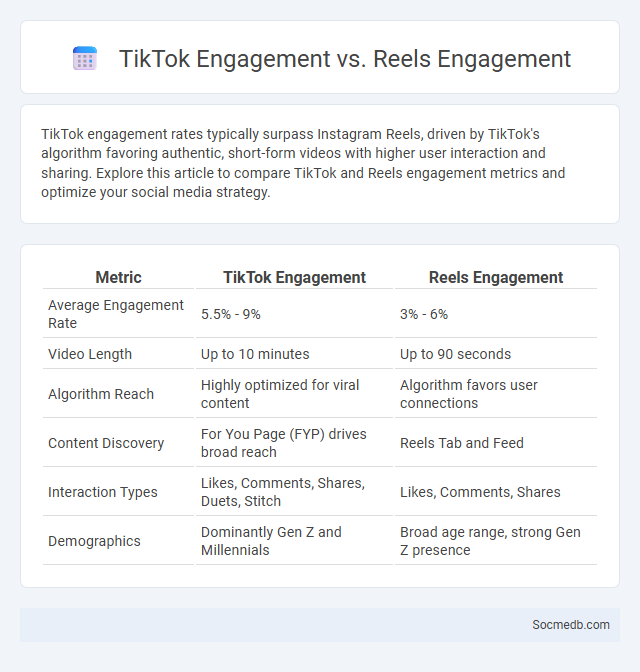
Photo illustration: TikTok Engagement vs Reels Engagement
TikTok engagement rates typically surpass Instagram Reels, driven by TikTok's algorithm favoring authentic, short-form videos with higher user interaction and sharing. Explore this article to compare TikTok and Reels engagement metrics and optimize your social media strategy.
Table of Comparison
| Metric | TikTok Engagement | Reels Engagement |
|---|---|---|
| Average Engagement Rate | 5.5% - 9% | 3% - 6% |
| Video Length | Up to 10 minutes | Up to 90 seconds |
| Algorithm Reach | Highly optimized for viral content | Algorithm favors user connections |
| Content Discovery | For You Page (FYP) drives broad reach | Reels Tab and Feed |
| Interaction Types | Likes, Comments, Shares, Duets, Stitch | Likes, Comments, Shares |
| Demographics | Dominantly Gen Z and Millennials | Broad age range, strong Gen Z presence |
Understanding TikTok Engagement Metrics
TikTok engagement metrics include likes, comments, shares, and watch time, which collectively indicate content popularity and user interaction. Understanding the TikTok algorithm's preference for authentic, high-retention videos helps creators optimize content for maximum visibility. Tracking metrics such as follower growth, video completion rate, and trending hashtags enables more strategic content planning and audience targeting.
Key Factors Influencing Reels Engagement
Reels engagement on social media is driven by factors such as video length, content relevance, and visual appeal, which capture viewer attention quickly. Use of trending audio and hashtags increases discoverability, boosting your reach and interactions. Timely posting aligned with peak user activity enhances visibility and strengthens connection with your audience.
The Rise of Vertical Video Content
Vertical video content has surged in popularity, driven by mobile-first platforms like TikTok, Instagram Reels, and Snapchat Spotlight, which prioritize full-screen, portrait-oriented viewing experiences. This format enhances user engagement by fitting naturally within smartphone displays, promoting longer watch times and higher interaction rates. Brands leveraging vertical video witness improved ad performance and increased audience reach due to its seamless integration with social media consumption habits.
Audience Demographics: TikTok vs Reels vs Vertical Video
TikTok's audience heavily consists of Gen Z users, with approximately 60% aged between 16 and 24, favoring short, engaging videos driven by trends and challenges. Instagram Reels appeals to a slightly older demographic, primarily Millennials aged 25 to 34, blending influencer marketing with lifestyle and fashion content. Vertical video formats, prevalent across platforms, cater to mobile-first users seeking immersive, quick-consumption content, with engagement rates peaking in younger age groups who prefer authentic and visually dynamic storytelling.
Content Algorithms: How Engagement Differs
Content algorithms on social media prioritize posts based on varied engagement metrics such as likes, shares, comments, and watch time, which influence the visibility of your content. Platforms like Instagram and TikTok use machine learning to analyze user interactions, ensuring that highly engaging posts reach a broader audience. Understanding these algorithmic differences allows you to tailor content strategies effectively to maximize reach and engagement.
Short-Form Video Trends: Platform Comparison
TikTok, Instagram Reels, and YouTube Shorts dominate the short-form video landscape with unique engagement features and audience demographics. TikTok leads with 1 billion active users focusing on viral trends and algorithm-driven content discovery, while Instagram Reels integrates seamlessly into the existing social experience attracting 500 million users daily. YouTube Shorts capitalizes on its vast video library and monetization options, reaching over 30 billion daily views and appealing to creators aiming for long-term audience growth.
Creative Strategies for Maximizing Engagement
Creative strategies for maximizing social media engagement include leveraging interactive content such as polls, quizzes, and live videos to foster real-time audience participation. Utilizing user-generated content and storytelling techniques enhances authenticity and builds community trust. Consistent A/B testing of posting times, captions, and visual formats ensures optimized reach and higher interaction rates across platforms like Instagram, Facebook, and TikTok.
Analytics Tools for Measuring Vertical Video Success
Social media analytics tools like TikTok Analytics, Instagram Insights, and YouTube Analytics provide in-depth metrics for measuring vertical video success, including viewer retention, engagement rates, and watch time. These platforms track conversion rates, audience demographics, and peak viewing times to optimize content strategy specifically for vertical formats. Leveraging data from these tools enables creators and marketers to refine vertical video content, maximizing reach and effectiveness in social media campaigns.
Case Studies: Brands Winning with TikTok, Reels, and Vertical Video
Brands leveraging TikTok, Instagram Reels, and vertical video formats have significantly increased engagement through authentic storytelling and trending challenges. Your marketing strategy can benefit from analyzing case studies like Gymshark's viral TikTok campaigns or Sephora's use of Reels to showcase beauty tutorials, demonstrating how short-form video drives brand awareness and sales. Adopting these proven tactics boosts reach and fosters a deeper connection with younger, mobile-centric audiences.
Future Predictions: The Evolution of Vertical Video Engagement
Vertical video engagement is projected to dominate social media platforms as mobile usage continues to surge, with user preferences shifting toward immersive, full-screen content formatted for smartphones. Advances in AI-driven personalization will tailor vertical video feeds to optimize viewer retention and interaction, enhancing Your content's relevance and impact. Interactive features like shoppable links and augmented reality overlays will further evolve vertical video as a primary tool for brand engagement and e-commerce integration.
 socmedb.com
socmedb.com